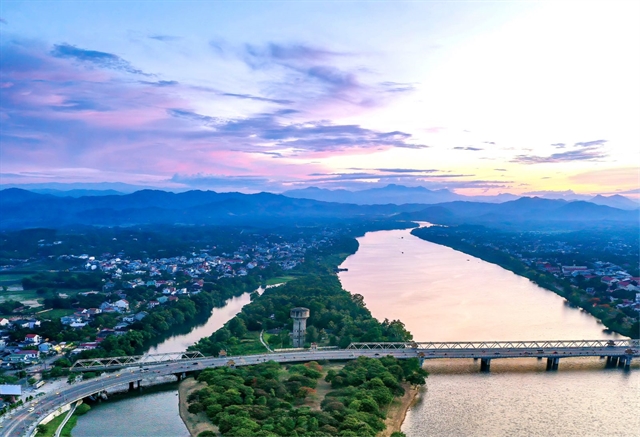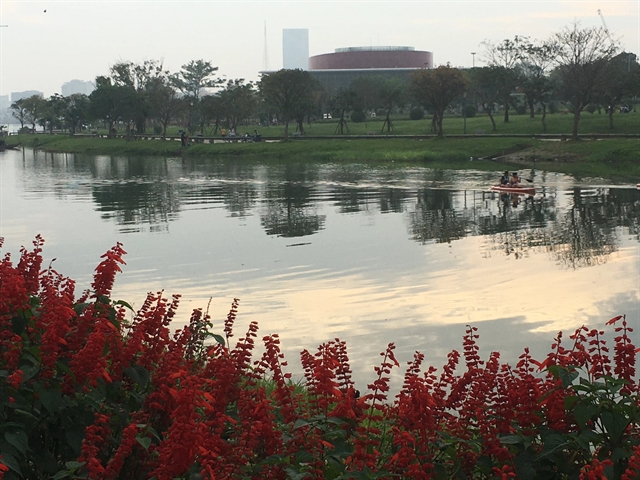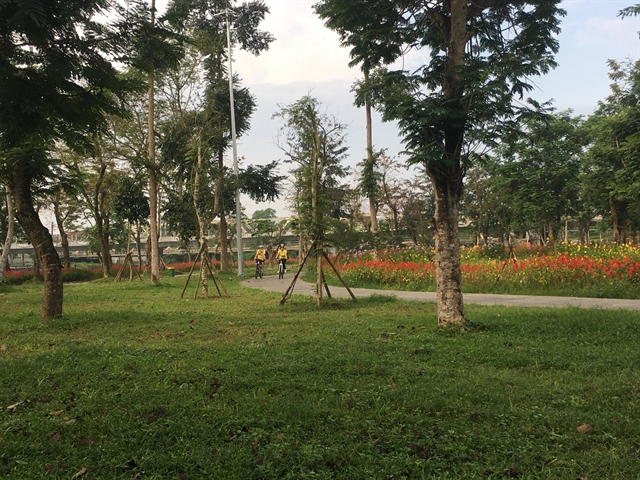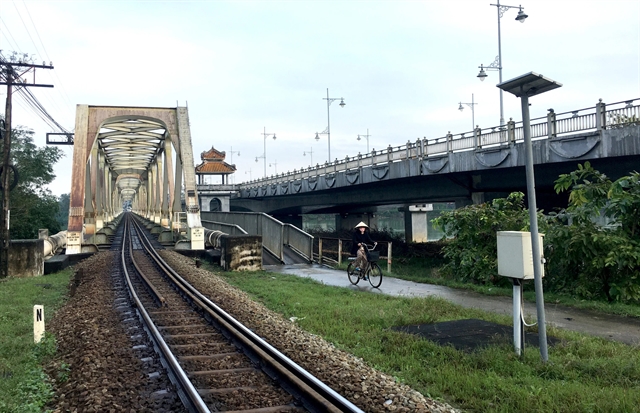Weather:
- Ha Noi 34oC
- Da Nang 30oC
- Ho Chi Minh 34oC

The location and unique landscape of Dã Viên, an islet in the Hương (Perfume) River, is part of the tranquil beauty of Huế, a poetic landmark on the ancient city's tourism map.
After nearly two years since the former royal capital city first kicked off a project on upgrading the islet in early 2021 as part of a plan for developing tourism on both banks of the Hương River, Dã Viên has become a favourite spot for locals and visitors to enjoy the natural beauty there.
The islet is seldom without human footsteps, especially at dawn or sunset. Local residents are seen practising yoga and sitting in meditation, and visitors taking photos of the indescribably beautiful and peaceful scenery.
The emergence of storks and other birds to live and forage has also created a lively eco-space at Dã Viên.
"The winding path around the east bank of the islet with a length of 1,100m connects under a road and a bridge, stretching to the eastern tip of the islet, which is beautifully paved with stones," said Nhất Minh, a local visitor who spends time everyday walking in the islet.
"The system of green trees creates a cool and luxurious atmosphere. In the heart of the islet, new lawns and flower gardens have been planted, and next to the tip of the islet lies a yellow ochna garden."
Looking down from Dã Viên Bridge, the landscape resembles a miniature forest. Standing in the middle of the islet, one can easily see Phú Xuân and Tràng Tiền bridges, and the pedestrian roads alongside the riverbanks.
"It’s so beautiful" say many people when they see the change of the islet after its renovation. Standing here, people can feel the value of a green city, and find peace in the fresh air.
In addition to creating a public space, the area is also considered as a multipurpose cultural area, connecting with green parks and walking routes.
The renovation project of the eastern bank of Dã Viên has cost of VNĐ11 billion, according to Lê Như Chính, director of the Huế Green Park Centre.
Chính said the renovation was not difficult because it was based on the islet's inherent nature. After four months, the islet space had taken shape with beautifully trimmed and newly planted trees.

Historical story
Dã Viên together with Hến Islet are the two land dunes formed on the Hương River in front of the Huế Citadel. According to feng shui belief, the two riverine islets symbolise the two oriental mythological creatures of Green Dragon and White Tiger, defending the capital city. Hến Islet referred as the Green Dragon is on the left, while Dã Viên as the White Tiger on the right.
Everyone knows about Dã Viên, but not many know it used to be a royal park of King Tự Đức (1829 – 1883) in the Nguyễn Dynasty. The name Dã Viên (or Park in the Wilds) was given by the king, who was also a famous poet.
The king "re-designed" the landscape of the dune, removing unwanted plants, and planting new trees. Right in the middle, he ordered the building of the Quan Phong high gazebo to admire the scenery. On both sides of the floor are paths leading to the wharf for fishing boats. A court was also built for the king to practise martial arts. Dã Viên was known as the "very beloved house" of the king in the last 15 years of his life.
In 1883, after the king passed away, the Nguyễn Dynasty was in crisis. Dã Viên gradually became derelict until 1908 when the French built a railway bridge across the islet.
Then, in 1953, to the west of the railway bridge, a water plant was built with a 40m high water tower. It gave the royal garden a new look.
About 60 years later, in 2012, one more Dã Viên road bridge, 542m long, 24m wide, with four car lanes and two sidewalks, was inaugurated. These are the main works around the islet. In addition to about a dozen households living upstream, there had not been yet any additional work on this 56,000sq.m dune.
At the 2004 Tree Planting Festival, the Huế Greenery Park Centre planted about 3,000 trees of various varieties. Good soil, fast-growing trees added greenery to Dã Viên Islet, attracting birds to search for food and live, creating a wonderful beautiful corner for Huế.

Renewing works
The prime location and superb views of Dã Viên have captured the attention of authorities and tourism businesses.
In 2016, a private company applied for a project to build a 5-star resort on the islet. However, as the islet is associated with the feng shui elements of Huế Citadel and it contains many heritage relics of the Nguyễn Dynasty, the project immediately met with objections.
Finally, in early 2021, the Huế City authorities decided to invest in renewing Dã Viên. This move was in the city planning project of both banks of the Perfume River. The work was assigned to the Huế Green Park Centre.
Speaking about the renovation project on the islet, Phan Ngọc Thọ, former chairman of the provincial People's Committee, said the project aimed to build the islet as a public cultural and traditional space.
It also aimed to preserve the heritage values of the area to form an aesthetic highlight for the Hương River, contributing to the plan on building Thừa Thiên Huế into a "green, clean and bright" province.
The embellishment in the eastern part of the islet is only in the first stage. For the next one, the province will build a royal park like that of the Nguyễn Dynasty in the western part.
The completed work will connect with the pedestrian route along the Hương River, which is being built to link to Huyền Trân Công Chúa Street, promising to create a unique and impressive cultural-historical landscape for the former imperial capital city of Huế. VNS



